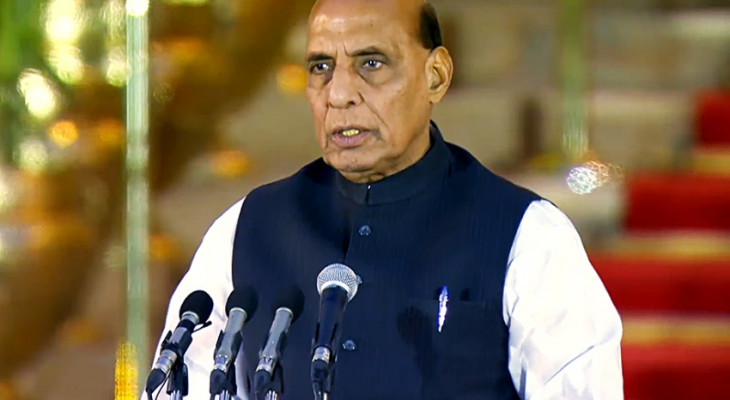Add your promotional text...
India's Defence Exports Projected to Reach ₹50,000 Crore by 2029-30: Insights from Rajnath Singh Ji
Synopsis: On the occasion of the 65th Foundation Day of IIT Kanpur, Defence Minister Rajnath Singh emphasized India's commitment to self-reliance in defense technology, outlining ambitious goals for defense exports and calling upon the youth to drive innovation. The event highlighted the government's initiatives aimed at fostering a robust defense ecosystem, showcasing advancements made by startups, and reinforcing the vision of a developed India by 2047.
TOP STORIES
By Vishwash Saxena
11/3/20243 min read


In a significant address during the 65th Foundation Day celebrations at the Indian Institute of Technology (IIT), Kanpur, Defence Minister Rajnath Singh articulated the promising trajectory of India’s Aatmanirbhar (self-reliance) initiative in the defense sector. The Minister confidently projected that India’s defense exports could reach an impressive ₹50,000 crore by the fiscal year 2029-30, underscoring the fruitful results of the government’s self-reliance campaign.
The Drive Towards Self-Reliance
Minister Singh urged the nation’s youth to harness their creativity and intelligence to develop advanced technologies that India currently imports. This call to action aligns with Prime Minister Narendra Modi’s vision of ‘Viksit Bharat’ (Developed India), which aims for comprehensive development across all sectors by 2047. He highlighted the critical role that institutions like IIT Kanpur play in this endeavor, describing them as “academic engines” that can fuel India’s dynamism in an increasingly competitive global landscape.
Over the past decade, India has witnessed a remarkable transformation in its defense exports, which soared from a modest ₹600 crore to a record-breaking ₹21,000 crore in the Financial Year 2023-24. This growth is attributed to a concerted effort by the government to bolster self-reliance in defense, driven by a robust focus on indigenous capabilities and innovations.
Technological Advancements in Defence
Rajnath Singh pointed out the ongoing global conflicts that emphasize the necessity for advanced technology in modern warfare. He mentioned that contemporary warfare is increasingly technology-oriented, with innovations in drones, laser systems, cyber warfare, precision-guided munitions, and hypersonic missiles reshaping the battlefield landscape.
The Minister acknowledged that a significant barrier to achieving complete self-reliance lies in the dependence on foreign imports for certain high-end technologies crucial for defense production. He stressed the urgency to focus on defense applications of cutting-edge technologies to adapt to the evolving nature of warfare. The government remains committed to supporting initiatives that foster collaboration among various stakeholders, including the private sector and academic institutions, to address this challenge.
Initiatives Supporting Innovation
In his speech, Singh elaborated on several government initiatives designed to promote self-reliance and foster innovation within the defense sector. The Innovations for Defence Excellence (iDEX) program was highlighted as a pivotal initiative providing financial support to startups and innovators, with grants of up to ₹1.5 crore available to facilitate groundbreaking ideas. Furthermore, the Acing Development of Innovative Technologies with iDEX (ADITI) scheme has been introduced to support critical defense technology innovations, offering up to ₹25 crore in grant-in-aid to eligible startups.
Rajnath Singh emphasized the three key phases of technology manufacturing: ideation, application, and production. He noted that institutes like IIT Kanpur are instrumental in nurturing ideas and transforming them into viable products. The Minister called for a collaborative approach to developing products that meet the needs of the Armed Forces, reinforcing the importance of innovation in maintaining national security.
Celebrating Defence Innovation at IIT Kanpur
As part of the Foundation Day celebrations, IIT Kanpur hosted a special event focused on defense innovation, aligning with the vision of an Aatmanirbhar Bharat. The Defence Research, Product, and Incubation Showcase organized by the Start-up Incubation and Innovation Centre (SIIC) highlighted groundbreaking solutions from 23 incubated startups, showcasing advancements in autonomous systems, AI-driven surveillance, and next-generation communication technologies.
During the exhibition, Rajnath Singh engaged with startup founders and research teams, praising their efforts to enhance national security through innovative technologies. He also witnessed the signing of several Memorandums of Understanding (MoUs) aimed at strengthening collaborations in military logistics and defense innovation, including partnerships with BEML and Hindustan Aeronautics Limited.
In a further commitment to fostering defense innovation, Singh received sanction letters for six transformative projects from the Defence Research and Development Organisation (DRDO) and noted the importance of funding support from the Small Industries Development Bank of India (SIDBI) for iDEX-funded startups.
Looking Towards the Future
The event also facilitated discussions on India’s latest defense initiatives, including the iDEX Defence India Start-up Challenge 12 and ADITI 2.0 Challenges. These discussions provided valuable insights into the current landscape of defense innovation, highlighting the government’s commitment to fostering a thriving ecosystem for startups and innovators.
In a symbolic gesture, Rajnath Singh led a tree plantation ceremony, representing IIT Kanpur’s enduring legacy in technological advancement and its commitment to sustainability.
With participation from key figures, including the Secretary of Defence Production, the Secretary of Defence Research and Development, and the Director of IIT Kanpur, the event not only celebrated past achievements but also set a promising course for India’s future in defense technology and self-reliance.
In conclusion, as India embarks on this ambitious journey towards self-reliance in defense, the collaboration between government, industry, and academia will be vital in harnessing the potential of the nation’s youth and driving innovation. The commitment to Aatmanirbhar Bharat is not just about achieving defense autonomy; it is about realizing the dream of a developed and prosperous India by 2047.
